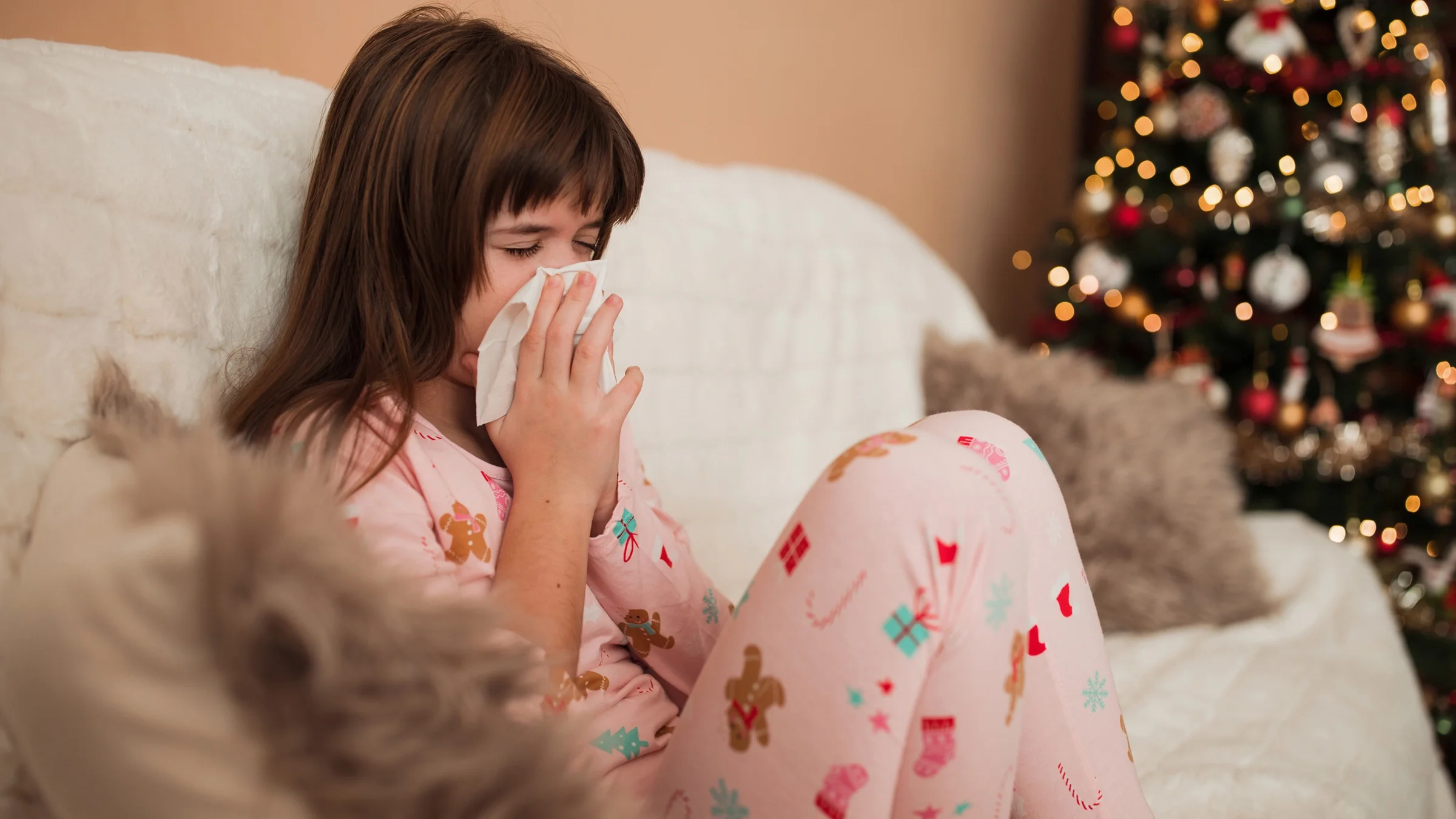Key takeaways:
It’s possible to get the flu (influenza) two times in one season. This is because there are different strains of the flu virus in a single season.
One of the most effective ways to prevent a severe flu infection is to get your yearly flu vaccine.
Most flu symptoms can be managed at home, but you should get medical help if you develop breathing problems.
Respiratory infections like the flu (influenza) often increase as the weather gets colder and the seasons change. Usually, infection with a germ causes the body to make antibodies to help fight a similar infection in the future. But, frustratingly, it’s possible to get sick multiple times in one season.
And this can happen with the flu. If you’ve had the flu once but get similar symptoms a few weeks later, it’s reasonable to check for flu again. This is because you may still be at risk for another flu infection, even if you’d just had the flu that same month.
Why are back-to-back flu infections possible?
It’s possible to come down with the flu more than once in the same season, because there’s usually more than one version of the virus spreading around. There are two main types of flu: influenza A and influenza B. Each of these has subtypes or lineages, and one usually ends up being the main flu strain in a given flu season. But other strains are still out there, which means it’s possible to get sick again later on, even in the same year.
Search and compare options
A few different things can raise your chances of catching the flu back to back:
Different flu strains: Getting sick from one strain doesn’t protect you from all the others. So, if you’ve already had the flu, you can still catch a different strain later.
Virus mutation: Flu viruses are constantly changing. Even if you’ve already fought one off, a slightly different version of the same flu strain can come along and infect you again.
Weakened immune system: If your immune system isn’t at full strength — whether from another illness, stress, or a health condition — it may be easier for you to catch the flu again.
Can you get influenza after having the flu shot?
Yes, it’s possible to get the flu after you get the flu shot. This can happen if:
You’re infected with a strain that’s different from what's in the vaccine.
Your body hasn’t had enough time to develop an immune response, which can take up to 2 weeks.
You didn't develop a strong enough immune response.
But you can’t get the flu from the flu shot itself. There’s no live virus in the flu vaccine, and it can’t cause infection. The nasal spray vaccine (Flumist) does have live virus. But it has been weakened, so it doesn't cause infection.
The flu vaccine can bring on some mild flu-like symptoms. These side effects are short lived (1 to 2 days). And they mean that your immune system is responding to the vaccine. But you shouldn’t develop severe illness from the vaccine. Overall, the benefits of the vaccine far outweigh the risks.
Are you immune to the flu after having it?
Yes, to a degree. Your body builds immunity against the strain of flu virus you got infected by. But the flu virus constantly changes itself in an effort to escape the human immune system. And your body won’t have immunity to the changes in the virus. So, it’s possible to get infected by a variant of that same strain or a totally different strain in the same flu season.
When is flu season anyway? In the U.S., flu season usually runs from October through May. Learn more about flu season monitoring.
Flu vaccine effectiveness: The flu vaccine isn’t perfect, but it’s the best way to protect yourself from severe illness. Here’s how effective this year’s vaccines are.
Flu recovery timeline: Getting the flu is no fun. Learn about the stages of flu recovery and when you can expect to get back to your usual routines.
Who’s most at risk for catching the flu multiple times?
It’s difficult to predict who’ll catch the flu more than once in a season. But you’re more at risk of catching the flu multiple times if you:
Aren’t vaccinated
Have medical conditions that affect your immune response — like lupus, sickle cell disease, or HIV
Take medications that suppress your immune system
Don’t practice habits that reduce your risk of infection — like handwashing, masking, and avoiding crowded places
You also have a higher risk of becoming severely ill from the flu if you:
Are very young (less than age 2) or over age 65
Have underlying medical conditions — like asthma, chronic obstructive pulmonary disease (COPD), heart problems, or diabetes
Are pregnant
Read more like this
Explore these related articles, suggested for readers like you.
What’s the best way to build up immunity against the flu?
The best way to protect yourself against the flu and to develop immunity is to get your yearly flu vaccine. But keep in mind, the vaccine doesn’t guarantee 100% immunity against the flu.
Each person’s immune system may respond differently to the vaccine. And since the virus changes itself, scientists have to predict which strain of the flu is most likely to cause infection. This happens about a year in advance, and the accuracy varies from year to year. But getting vaccinated is still the best chance at building immunity each season. The flu vaccine also helps to prevent severe illness, hospitalization, and death from the flu.
When should you get medical attention for influenza?
Often, people can manage most flu symptoms at home with natural remedies and rest. But the flu can cause severe illness, so it’s helpful to know when it’s time to connect with a healthcare professional. Get medical attention if you have:
Trouble breathing
Chest pain
An oxygen level lower than 90% (using a pulse oximeter)
Vomiting that won’t stop
Extreme weakness
Dizziness
Most minor flu symptoms should resolve within 7 to 10 days with supportive treatment and good hydration. Over-the-counter (OTC) medications can help relieve minor flu symptoms, like:
Fevers
Body aches
Fatigue
Poor appetite
Frequently asked questions
You'll likely have protection against the same strain you got infected with for the remainder of that flu season. But keep in mind that there are different strains of the influenza virus in a single season. That’s why you can get the flu twice in a year. And it’s why you should take preventive action, like washing your hands often and avoiding close contact with people who’re sick.
Both influenza A and B strains are part of the yearly flu season. Some strains of influenza A have caused flu pandemics in the past, but this hasn't been the case with influenza B. Influenza A affects both humans and other animals. And it tends to cause most cases of the flu. It also mutates quickly, which makes it harder to predict and prevent.
Flu symptoms usually last about 1 week. But some symptoms, like cough and tiredness, can hang around for several weeks. Get medical attention if you notice that your symptoms are lessening and then come back or get worse again. This can be a sign that you're developing another infection, like pneumonia, an ear infection, or a sinus infection.
You'll likely have protection against the same strain you got infected with for the remainder of that flu season. But keep in mind that there are different strains of the influenza virus in a single season. That’s why you can get the flu twice in a year. And it’s why you should take preventive action, like washing your hands often and avoiding close contact with people who’re sick.
Both influenza A and B strains are part of the yearly flu season. Some strains of influenza A have caused flu pandemics in the past, but this hasn't been the case with influenza B. Influenza A affects both humans and other animals. And it tends to cause most cases of the flu. It also mutates quickly, which makes it harder to predict and prevent.
Flu symptoms usually last about 1 week. But some symptoms, like cough and tiredness, can hang around for several weeks. Get medical attention if you notice that your symptoms are lessening and then come back or get worse again. This can be a sign that you're developing another infection, like pneumonia, an ear infection, or a sinus infection.
The bottom line
Having the flu (influenza) can be a miserable experience that you may not want to repeat. But it can happen twice in a single season. That’s because there are multiple strains of the flu every season. Usually one or two types are dominant. But infection with one strain doesn’t protect you against the others.
Getting the flu vaccine is one proven way to reduce your chances of getting the flu. Good hygiene practices such as handwashing and wearing masks can cut down your risk as well.

Why trust our experts?



References
Centers for Disease Control and Prevention. (2023). Flu vaccine safety.
Centers for Disease Control and Prevention. (2024). About pandemic influenza.
Centers for Disease Control and Prevention. (2024). People at increased risk for flu complications.
Centers for Disease Control and Prevention. (2024). Signs and symptoms of flu.
Centers for Disease Control and Prevention. (2025). Preventing seasonal flu.
Centers for Disease Control and Prevention. (2025). Types of influenza viruses.
















